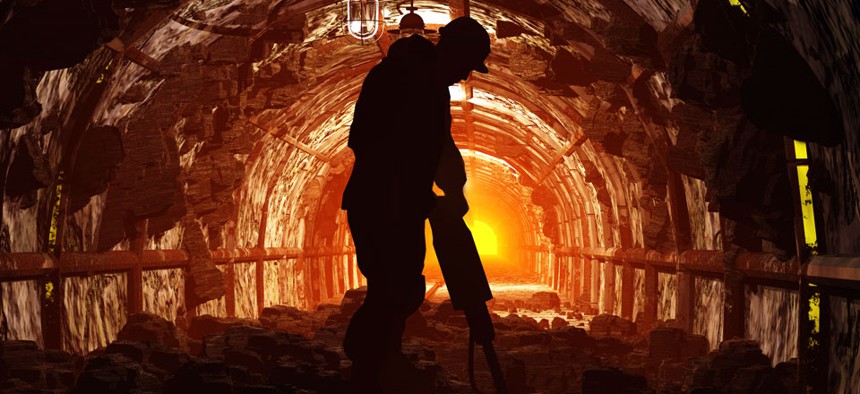
iurii/Shutterstock.com
How Can the U.S. Fix The Case Backlog of Black-Lung-Stricken Miners?
Congressional leaders and labor officials convened this week to address a broken federal compensation program for miners with the disease.
For Robert Bailey Jr., breathing doesn't come naturally.
At least not anymore. After 36 years as a union coal miner, Bailey suffers from pneumoconiosis, commonly known as black-lung disease, a respiratory illness caused by prolonged exposure to coal dust.
"Living with black lung is thinking about every breath you take," Bailey, now retired, told Congress on Tuesday. "Breathing is something most people take for granted, as it is a normal involuntary function of our bodies. It comes natural as we walk, do our daily jobs, come and go. But with this disease, I am reminded constantly as I struggle to breathe whether I am simply walking up my slight incline of a yard, or ... at our church when we give out food."
Bailey, now retired, was speaking at a hearing called by the Senate Health, Education, Labor, and Pensions Committee to address serious flaws, first exposed by a report last fall, in a federal compensation program for coal miners stricken with black-lung disease.
Miners who pursue black-lung benefits have to wait more than a year for their cases to be heard by an administrative law judge, and a final decision can take another few years. The Labor Department's Office of Workers' Compensation Programs pays for these miners' pulmonary evaluations. Right now, the department is facing a 2,856-case backlog.
Sen. Robert Casey, D-Pa., said that coal miners pursuing benefits wait an average of 429 days before their cases reach a judge. "Our nation's hardworking miners and their families deserve much, much better than that," Casey said.
The claims program, administered by the Labor Department's Division of Coal Mine Workers' Compensation, provides monetary and medical benefits to thousands of disabled coal miners and to families of workers who died from the progressive illness. It was created by the Black Lung Benefits Act of 1969 because state-level workers' compensation programs were failing to meet coal miners' health needs.
A yearlong investigation by ABC News and the Center for Public Integrity last October suggested that the federal program itself wasn't working for some coal miners. Their report found that more than 1,000 coal miners who filed claims may have been wrongly denied benefits. Some workers who were not granted benefits were later found to have the disease—through autopsies, after they had died. The investigation also suggested that coal companies' attorneys hid from administrative judges some medical evidence for employees pursuing black-lung benefits.
"The department took these reports seriously," Labor Deputy Secretary Christopher Lu told Congress, before diving into a list of fixes that have been put in place since October's report.
The department is now asking all miners whose claims were denied to reapply. It is especially targeting miners who received care from Dr. Paul S. Wheeler, the head of Johns Hopkins' black-lung program. Wheeler, October's report found, had not reported a single instance of the disease in more than 1,500 claims dating back to 2000. Hopkins is conducting an investigation, and doctors there are forbidden from performing black-lung X-ray readings, which help in diagnosis, until the investigation is over.
The Labor Department also plans to add two administrative law judges to review cases, and to bring a judge out of retirement to handle claims in Pittsburgh, in the heart of Pennsylvania's coal country. The department will also help miners whose applications have been denied to obtain more medical evidence for a renewed attempt.
Lu said the department may need more resources than it has now to handle new claims, which he projects will total 7,100 by the end of this fiscal year, a 10.6 percent increase over filings in fiscal 2013.
The Senate committee welcomed Lu's fixes this week, but the problems are far from over. More-aggressive measures require legislative action, which is unlikely to come quickly. Congressional leaders have yet to push through any legislation to help the broken Veterans Affairs department, which has also kept people waiting for months for medical care. The disabled coal miners waiting for resolution of their claims know not to hold their breath.
The headline and text of this story has been updated to clarify the size of the backlong of black lung claims.







